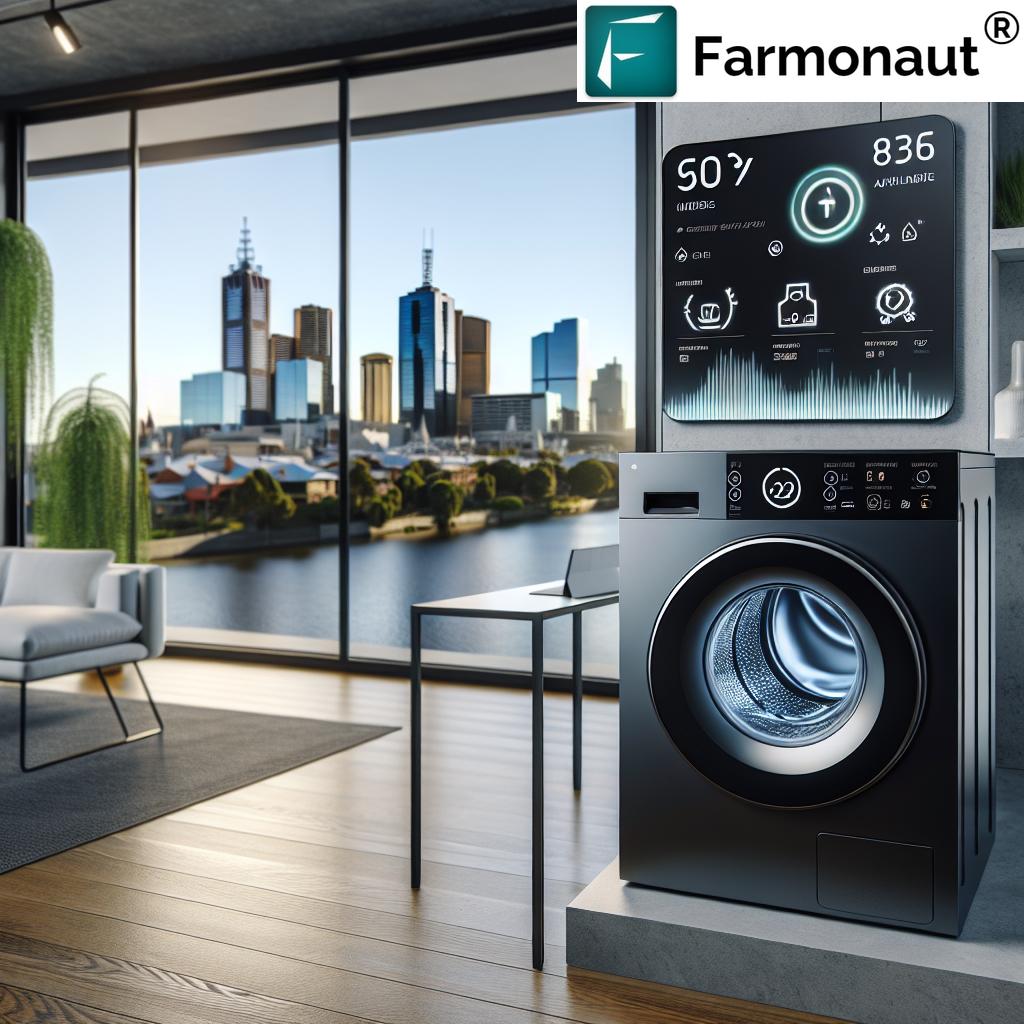Revolutionizing Australian Home Appliances: Sustainable Innovation Meets Smart Technology in Melbourne
“The Australian Open tennis tournament partnership for 2025-2027 will showcase sustainable home appliances to over 800,000 annual attendees.”
In the heart of Melbourne, a groundbreaking collaboration is set to transform the landscape of Australian home appliances. As we step into a new era of sustainability and smart technology, the Australian market is witnessing an unprecedented fusion of innovation and eco-consciousness. This partnership between a leading global brand and the prestigious Australian Open tennis tournament for 2025-2027 is not just a commercial venture; it’s a bold statement about the future of home living and our commitment to the planet.
The Dawn of a New Era in Home Appliances
We are entering an exciting phase where sustainable home appliances are no longer a luxury but a necessity. The collaboration we’re witnessing in Melbourne is a testament to the growing demand for eco-friendly consumer electronics that don’t compromise on performance or style. This partnership is set to showcase how smart home technology innovations can seamlessly integrate with our daily lives, making our homes more efficient, comfortable, and environmentally friendly.

At the forefront of this revolution are energy-efficient washing machines, designed to significantly reduce water and electricity consumption without sacrificing cleaning power. These machines are just one example of how the Australian home appliance market is evolving to meet the dual challenges of resource conservation and consumer expectations.
A Shared Vision for Excellence and Sustainability
The partnership between the global appliance market leaders and the Australian Open is built on a foundation of shared values. Both entities are renowned for their pursuit of excellence, commitment to innovation, and dedication to enhancing the consumer experience. This collaboration goes beyond mere sports marketing; it’s a platform to showcase how sustainability and high performance can coexist in the world of home appliances.
We believe that this partnership will inspire a healthy, energetic lifestyle that aligns perfectly with the spirit of tennis and the ethos of modern, eco-conscious living. By bringing together the excitement of world-class sports and cutting-edge home appliance innovation, we’re creating a unique opportunity to educate and inspire consumers about the benefits of sustainable living.
Localized Strategies for Global Impact
The success of this venture in Australia and New Zealand is a testament to the power of localized research and development. By tailoring products to meet the specific needs of the ANZ region, the company has achieved remarkable growth and consumer loyalty. This approach reflects a broader strategy of understanding and catering to diverse markets across the world.
“Energy-efficient washing machines developed through this collaboration could reduce household electricity consumption by up to 30%.”
The Australian market has embraced these innovations with open arms, recognizing the value of appliances that not only perform exceptionally but also contribute to a more sustainable future. This success story is not just about sales figures; it’s about creating a positive impact on consumers‘ lives and the environment.
Innovative Products Leading the Charge
Let’s take a closer look at some of the groundbreaking products that are setting new standards in the industry:
- Smart Refrigerators: Equipped with AI-driven temperature control and food management systems, these refrigerators optimize energy use while keeping food fresher for longer.
- Eco-Friendly Dishwashers: Using advanced water recycling technology, these dishwashers significantly reduce water consumption without compromising cleaning efficiency.
- Energy-Efficient Air Conditioners: Featuring inverter technology and smart climate control, these units provide optimal cooling while minimizing energy usage.
These innovations are not just improving individual households; they’re contributing to a larger movement towards sustainability in Australia and beyond.
The Role of ESG in Consumer Electronics
Environmental, Social, and Governance (ESG) principles are increasingly becoming central to business strategies in the consumer electronics sector. This partnership exemplifies how ESG can be seamlessly integrated into product development and marketing initiatives.
By showcasing green technologies during the Australian Open, the collaboration aims to:
- Raise awareness about ecological issues in home appliance usage
- Demonstrate the tangible benefits of sustainable technologies
- Inspire consumers to make more environmentally conscious choices
This approach not only benefits the environment but also resonates with the growing number of consumers who prioritize sustainability in their purchasing decisions.
Expanding Horizons: From Australia to the World
While the focus of this collaboration is on the Australian and New Zealand markets, its implications are global. The innovations and strategies developed here are setting benchmarks for other regions and countries. We’re seeing similar trends in Europe, where energy scarcity has driven demand for highly efficient appliances.
The success of products like the Haier Langjing X11 washing machine in European markets demonstrates the universal appeal of sustainable, high-performance home appliances. This global perspective ensures that the benefits of these innovations are not limited to any one region but can be adapted and implemented worldwide.

The Future of Home Living
As we look to the future, it’s clear that the home appliance industry is at the cusp of a major transformation. The convergence of sustainability, smart technology, and consumer-centric design is creating a new paradigm for home living. Here are some trends we expect to see in the coming years:
- Increased Integration of AI and IoT: Appliances will become smarter, learning from user habits to optimize performance and energy use.
- Advanced Energy Management Systems: Homes will be equipped with intelligent systems that balance energy use across all appliances for maximum efficiency.
- Circular Economy Principles: More appliances will be designed with recyclability and repairability in mind, reducing waste and extending product lifecycles.
- Personalized Sustainability Tracking: Consumers will have access to detailed data on their appliances’ environmental impact, empowering them to make informed decisions.
These advancements promise to make our homes not just smarter, but also more aligned with our values and environmental responsibilities.
Comparative Analysis: Sustainable Home Appliance Innovations
| Appliance Category | Key Innovation Feature | Estimated Energy Efficiency Improvement (%) | Estimated Water Savings (L/year) | Smart Technology Integration | Estimated Carbon Footprint Reduction (%) |
|---|---|---|---|---|---|
| Washing Machines | AI-powered load sensing | 30% | 15,000 | Remote control via app | 25% |
| Refrigerators | Advanced inverter technology | 25% | N/A | Smart temperature control | 20% |
| Dishwashers | Water recycling system | 20% | 3,000 | Auto-detergent dispensing | 15% |
| Air Conditioners | Heat pump technology | 40% | N/A | AI climate prediction | 35% |
This table illustrates the significant advancements in sustainable home appliance technology, showcasing the potential for substantial energy and water savings across various categories. The integration of smart technologies not only enhances user experience but also contributes to significant reductions in carbon footprint.
The Role of Partnerships in Driving Innovation
The collaboration between industry leaders and major sporting events like the Australian Open plays a crucial role in accelerating innovation and adoption of sustainable technologies. These partnerships provide:
- Increased Visibility: Showcasing innovations to a global audience
- Consumer Education: Opportunities to demonstrate the benefits of sustainable appliances in real-world settings
- Cross-Industry Collaboration: Fostering innovation through the exchange of ideas across different sectors
- Market Validation: Gaining valuable feedback from diverse consumer groups
By leveraging the excitement and global reach of major sporting events, these partnerships can significantly accelerate the adoption of sustainable home technologies.
Addressing Challenges in the Transition to Sustainable Appliances
While the move towards more sustainable and smart home appliances is promising, it’s not without its challenges. Some of the key issues that need to be addressed include:
- Initial Cost: Sustainable appliances often come with a higher upfront cost, which can be a barrier for some consumers.
- Technology Adoption: Ensuring that consumers of all ages and technical abilities can easily use smart features.
- Data Privacy and Security: As appliances become more connected, protecting consumer data becomes increasingly important.
- Infrastructure Requirements: Some smart appliances may require updates to home infrastructure, such as improved internet connectivity.
Addressing these challenges will be crucial for the widespread adoption of sustainable home technologies. Industry leaders are working on solutions such as:
- Developing more affordable models without compromising on sustainability features
- Creating intuitive user interfaces and providing comprehensive customer support
- Implementing robust data protection measures and transparent data usage policies
- Collaborating with telecommunications companies to improve smart home infrastructure
The Broader Impact on Australian Society and Economy
The shift towards sustainable and smart home appliances has far-reaching implications for Australian society and the economy:
- Job Creation: The growing sustainable appliance sector is creating new jobs in research, development, manufacturing, and servicing.
- Energy Grid Stability: Smart appliances can help balance the load on the electrical grid, potentially reducing the need for new power plants.
- Consumer Behavior Change: As people become more aware of their energy and water usage through smart appliances, it may lead to broader changes in consumption habits.
- Export Opportunities: Innovations developed for the Australian market could be exported, boosting the country’s position in the global appliance industry.
These developments align with Australia’s broader goals of reducing carbon emissions and transitioning to a more sustainable economy.
Looking Ahead: The Next Frontier in Home Appliance Innovation
As we look to the future, several exciting trends are emerging that could shape the next generation of home appliances:
- Predictive Maintenance: AI-powered systems that can predict when an appliance needs servicing before it breaks down.
- Energy Harvesting: Appliances that can generate their own power from ambient sources like heat or vibration.
- Modular Design: Appliances with easily upgradeable components, extending their lifespan and reducing waste.
- Virtual Reality Interfaces: Using VR technology for more intuitive control and troubleshooting of complex appliances.
These innovations promise to further enhance the sustainability and user experience of home appliances, pushing the boundaries of what’s possible in home technology.
Conclusion: A Sustainable Vision for Australian Homes
The partnership between global appliance leaders and the Australian Open represents more than just a marketing opportunity; it’s a vision for the future of Australian homes. By showcasing sustainable and smart home appliances on such a prominent stage, this collaboration is setting a new standard for what consumers can expect from their home technologies.
As we move forward, the integration of sustainability, smart technology, and user-centric design will continue to shape the evolution of home appliances. This not only promises a more comfortable and efficient home life for Australians but also contributes to the broader goals of environmental conservation and responsible resource management.
The journey towards more sustainable homes is ongoing, and collaborations like this play a crucial role in driving innovation and awareness. As consumers, industry leaders, and policymakers continue to prioritize sustainability, we can look forward to a future where our homes are not just smart, but also kind to our planet.
FAQ Section
Q: How do sustainable home appliances contribute to reducing carbon footprint?
A: Sustainable home appliances significantly reduce energy and water consumption, directly lowering greenhouse gas emissions associated with electricity production and water treatment. For example, energy-efficient washing machines can reduce electricity usage by up to 30%, translating to a substantial decrease in carbon emissions over the appliance’s lifetime.
Q: Are smart home appliances more expensive to maintain?
A: While smart appliances may have a higher initial cost, they often lead to long-term savings through reduced energy consumption and predictive maintenance features that can prevent costly breakdowns. Many manufacturers are also working to make repair and maintenance more accessible and affordable.
Q: How can consumers ensure their data is protected when using smart home appliances?
A: Consumers should look for appliances with robust security features, regularly update firmware, use strong Wi-Fi passwords, and be cautious about sharing data. Many manufacturers now offer detailed privacy policies and options to control data sharing.
Q: What is the expected lifespan of sustainable and smart home appliances?
A: Modern sustainable appliances are designed for longevity, with many expected to last 10-15 years or more. The integration of smart technology can actually extend this lifespan by enabling better maintenance and more efficient operation.
Q: How do these innovations in home appliances benefit the broader Australian community?
A: These innovations contribute to reduced energy demand, potentially lowering electricity costs for all consumers. They also create jobs in the tech and manufacturing sectors, and help Australia meet its environmental targets, benefiting the entire community through a cleaner, more sustainable future.
Earn With Farmonaut: Affiliate Program
Earn 20% recurring commission with Farmonaut’s affiliate program by sharing your promo code and helping farmers save 10%. Onboard 10 Elite farmers monthly to earn a minimum of $148,000 annually—start now and grow your income!
















